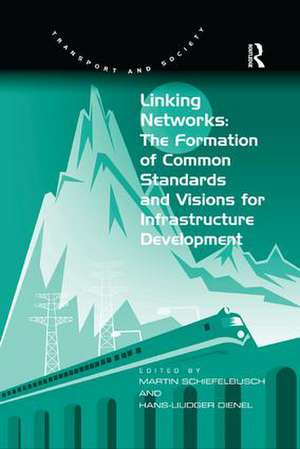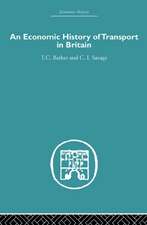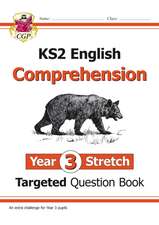Linking Networks: The Formation of Common Standards and Visions for Infrastructure Development
Autor Hans-Liudger Dienel Editat de Martin Schiefelbuschen Limba Engleză Paperback – 12 feb 2018
| Toate formatele și edițiile | Preț | Express |
|---|---|---|
| Paperback (1) | 446.13 lei 6-8 săpt. | |
| Taylor & Francis – 12 feb 2018 | 446.13 lei 6-8 săpt. | |
| Hardback (1) | 1054.78 lei 6-8 săpt. | |
| Taylor & Francis – 8 aug 2014 | 1054.78 lei 6-8 săpt. |
Preț: 446.13 lei
Nou
Puncte Express: 669
Preț estimativ în valută:
85.44€ • 88.03$ • 71.57£
85.44€ • 88.03$ • 71.57£
Carte tipărită la comandă
Livrare economică 24 februarie-10 martie
Preluare comenzi: 021 569.72.76
Specificații
ISBN-13: 9781138546523
ISBN-10: 1138546526
Pagini: 296
Dimensiuni: 156 x 234 x 16 mm
Greutate: 0.45 kg
Ediția:1
Editura: Taylor & Francis
Colecția Routledge
Locul publicării:Oxford, United Kingdom
ISBN-10: 1138546526
Pagini: 296
Dimensiuni: 156 x 234 x 16 mm
Greutate: 0.45 kg
Ediția:1
Editura: Taylor & Francis
Colecția Routledge
Locul publicării:Oxford, United Kingdom
Cuprins
Contents: Foreword, Matthias Ruete. Part I Introduction and Theoretical Background: Introduction and overview, Martin Schiefelbusch and Hans-Liudger Dienel; Methodological and conceptual challenges of comparisons across sectors and periods, Christian Henrich-Franke; Infrastructure and fragmentation: the limits of the integration paradigm, Jens Ivo Engels; Archetypes of international infrastructural integration, Gerold Ambrosius. Part II Case Studies: Two hundred years of failed tariff policy: a comparison of the Reich Freight Tariff Law and the common customs tariff of the EEC, Christian Henrich-Franke; Visions of rail development - the 'internationality of railways' revisited, Martin Schiefelbusch; Functionalistic spill-over and infrastructural integration: the telecommunication sectors, Christian Henrich-Franke; Transportation infrastructure integration in East Africa in a historical context, Jacqueline Klopp and George Makajuma; From liberalism to liberalization: international electricity governance in the twentieth century, Vincent Lagendijk; 'Wings for peace' versus 'airopia': contested visions of post-war European aviation in World War II Britain, S. Waqar Zaidi; Iron silk roads: comparing interwar and post-war transnational Asian railway projects, Irene Anastasiadou and Aristotle Tympas; Spatial and social effects of infrastructural integration in the case of the Polish borders, Tomasz Komornicki. Part III Comments: The expansion of infrastructures as 'the Second Party Programme': a look at the bright and dark sides of Soviet life, Klaus Gestwa; The challenges of transportation integration in the U.S.A., 1890-1960, Bruce E. Seely. Part IV Conclusions: Key findings of the case studies - a 'meta-analysis', Christian Henrich-Franke and Melissa Gomez; Experiences from comparative historical analysis - conclusions for research and policy, Gerold Ambrosius, Hans-Liudger Dienel and Martin Schiefelbusch. Index.
Notă biografică
Martin Schiefelbusch is a transport planner and researcher at Berlin Technical University and the nexus Institute in Berlin. Hans-Liudger Dienel is Professor at the Faculty of Humanities at Berlin Technical University and Managing Director of the nexus Institute.
Recenzii
’This impressive contribution tackles difficult but timely questions about technology, integration, and governance. The case studies, focused on European transport, communication and energy infrastructures will appeal to a wide audience, as will the authors’ deft comparative analysis and the editors’ sure overview of the complex and contested terrain.’ Thomas J. Misa, University of Minnesota, USA ’This is a timely book that informs the current debates on the future of our infrastructure governance. If you want to explore the various historical dimensions of this complex issue, read this book! The authors provide a rich set of case-studies paired with conceptual analysis. They compare various infrastructures across time and space, and they generate insights on long term continuities and infrastructural dynamics.’ Johan Schot, University of Sussex, UK
Descriere
Presenting recent research on the international integration of infrastructures in Europe, this book combines general and methodological chapters and examples from a variety of different sectors such as transport, electricity and communication networks. The wide range of topics gives a good overview of the different challenges posed and the strategies employed in each sector to establish internationally compatible networks, procedures and standards. This work strengthens comparative research as a complement to the detailed analysis of singular cases that often characterises previous works in this field.















